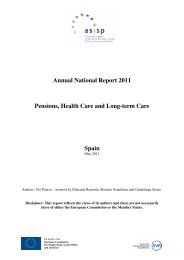Financial Sector Development in Africa: Opportunities ... - World Bank
Financial Sector Development in Africa: Opportunities ... - World Bank
Financial Sector Development in Africa: Opportunities ... - World Bank
You also want an ePaper? Increase the reach of your titles
YUMPU automatically turns print PDFs into web optimized ePapers that Google loves.
198 Dafe<br />
The degree of success, <strong>in</strong> turn, seems to depend on the political environment<br />
<strong>in</strong> which f<strong>in</strong>ancial policy mak<strong>in</strong>g takes place.<br />
Based on these experiences, the current consensus on the role of the<br />
state <strong>in</strong> the f<strong>in</strong>ancial sector takes it as a basic premise that the country’s<br />
political realities have to be taken <strong>in</strong>to account <strong>in</strong> the design of activist policies<br />
(Beck, Fuchs, and Uy 2009; Honohan and Beck 2007, 12). Although it<br />
is widely agreed that modernist approaches should be complemented<br />
through some form of activism to correct market failures and <strong>in</strong>crease<br />
f<strong>in</strong>ance for private <strong>in</strong>vestment, it is not recommended that <strong>Africa</strong>n policy<br />
makers put themselves <strong>in</strong> the lead <strong>in</strong> implement<strong>in</strong>g the activist agenda by<br />
<strong>in</strong>creas<strong>in</strong>g their direct engagement <strong>in</strong> the provision of f<strong>in</strong>ancial services<br />
(Honohan and Beck, 2007, 12). Rather, they are advised to smooth the way<br />
for private activists such as NGOs or social entrepreneurs. This view rests<br />
on the assumption that many <strong>Africa</strong>n governments lack adequate governance<br />
structures (Demirgüç-Kunt, Beck, and Honohan 2008, 143; Honohan<br />
and Beck 2007, 6, 11, 12; <strong>World</strong> <strong>Bank</strong> 1997). As table 6.1’s stylized comparison<br />
between <strong>Africa</strong>n and East Asian experiences with activism highlights,<br />
appropriate governance structures seem to be the major precondition<br />
for successful market <strong>in</strong>terventions. Where activism was successful, policies<br />
tended to be closely monitored and characterized by provisions that seek<br />
to h<strong>in</strong>der the political capture of policies by a powerful economic elite and<br />
the exploitation of the f<strong>in</strong>ancial sector as a source of government f<strong>in</strong>ance<br />
(De la Torre, Gozzi, and Schmukler 2007; Stiglitz and Uy 1996).<br />
Assess<strong>in</strong>g the Current Approach toward Activism<br />
The consensus on the role of government today is dist<strong>in</strong>ct from the predom<strong>in</strong>ant<br />
views of previous periods of market-replac<strong>in</strong>g activism or<br />
modernism <strong>in</strong> that it sees governments’ ma<strong>in</strong> role to be one of creat<strong>in</strong>g<br />
an enabl<strong>in</strong>g environment for f<strong>in</strong>ancial markets. As noted earlier, it is<br />
<strong>in</strong>creas<strong>in</strong>gly acknowledged that sometimes this role might have to go<br />
beyond competition policies and first-best <strong>in</strong>stitution-build<strong>in</strong>g toward<br />
affirmative regulation and other more direct <strong>in</strong>terventions, whereby good<br />
governance is regarded as a key determ<strong>in</strong>ant of the effectiveness of such<br />
policies (Honohan and Beck 2007, 12). For at least three reasons, this<br />
view on activism offers a realistic and promis<strong>in</strong>g way forward toward<br />
mak<strong>in</strong>g f<strong>in</strong>ance work for <strong>Africa</strong>.<br />
• First, the current consensus has the potential to spur on the development<br />
of <strong>in</strong>clusive f<strong>in</strong>ancial systems because it has overcome the dualism







